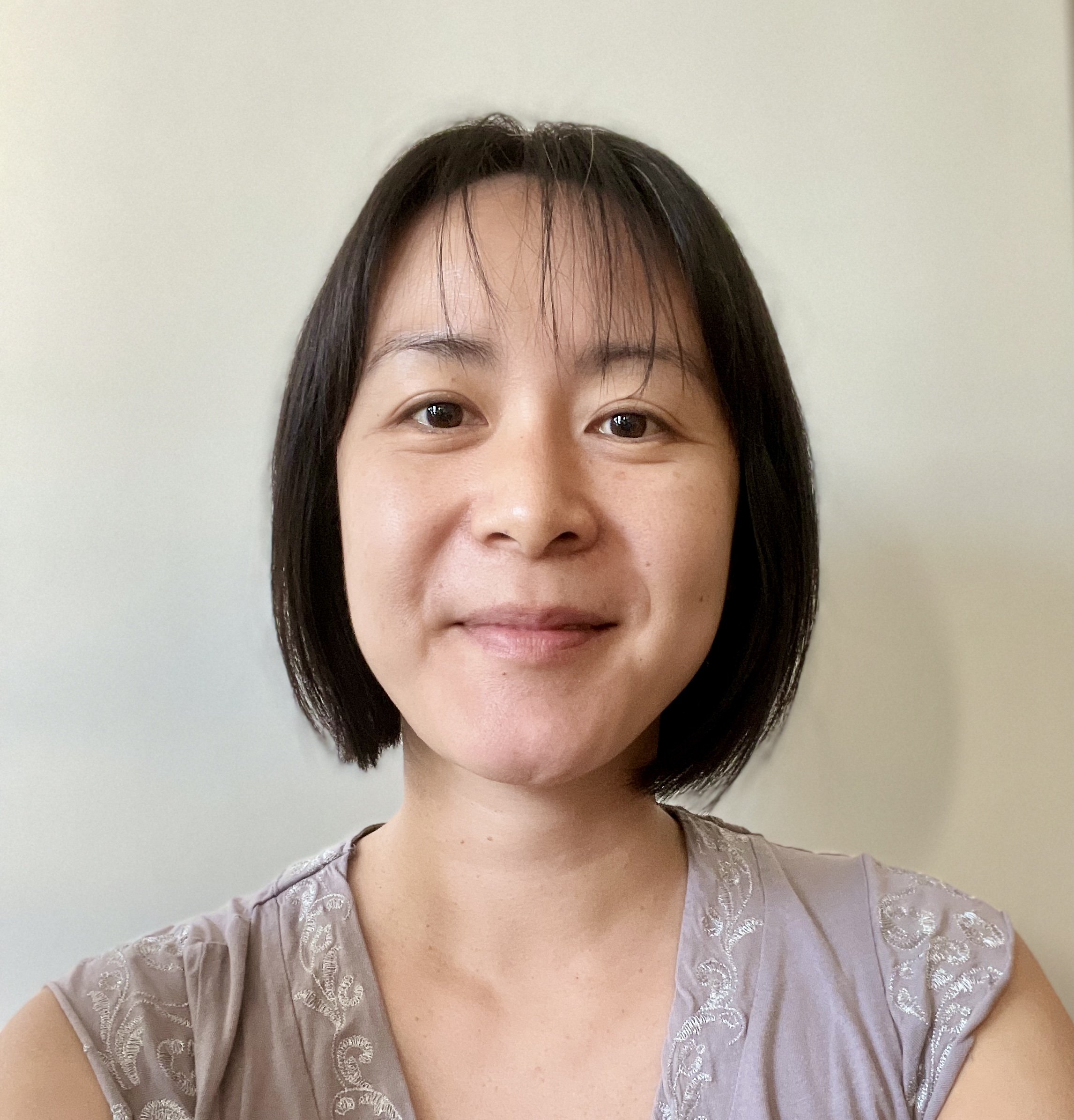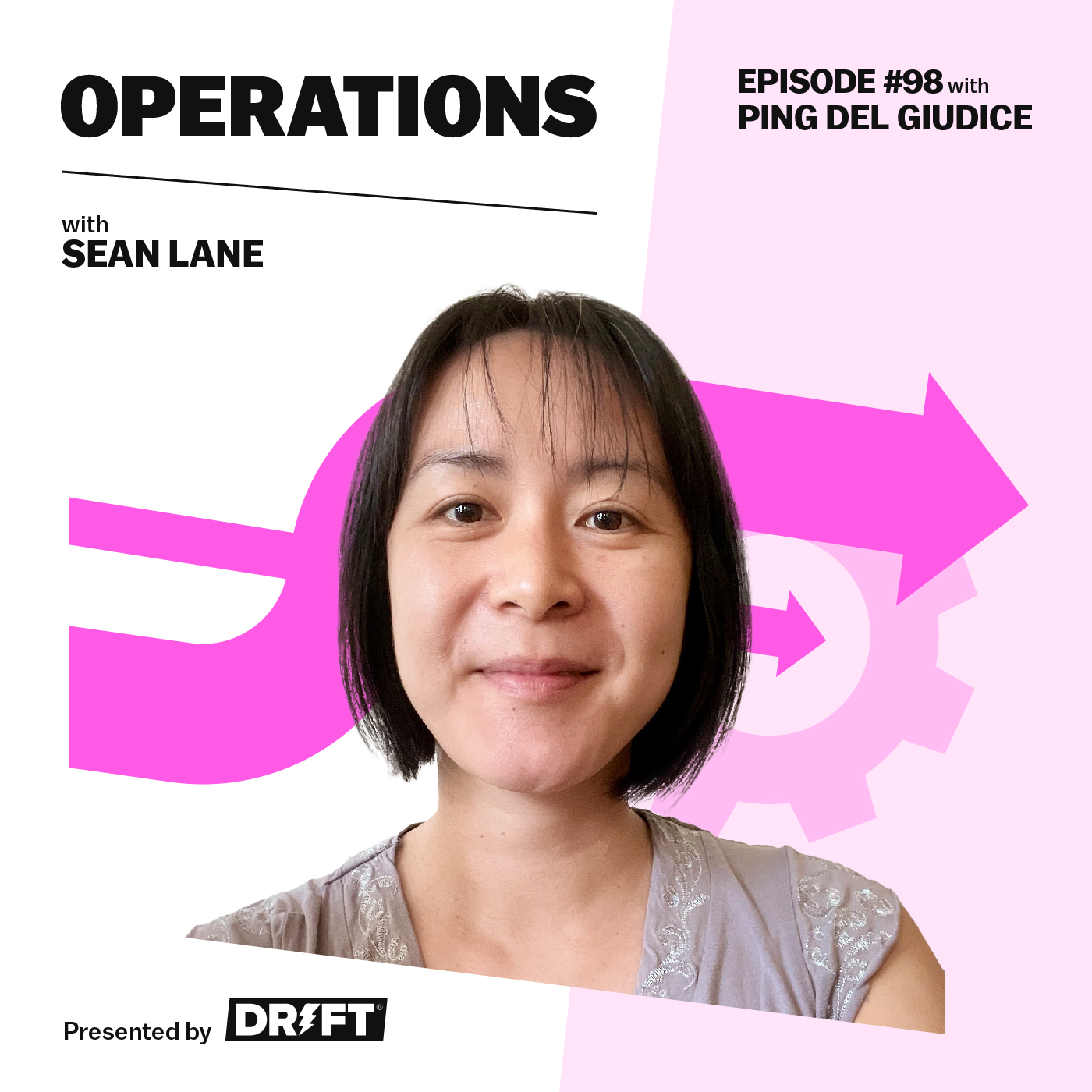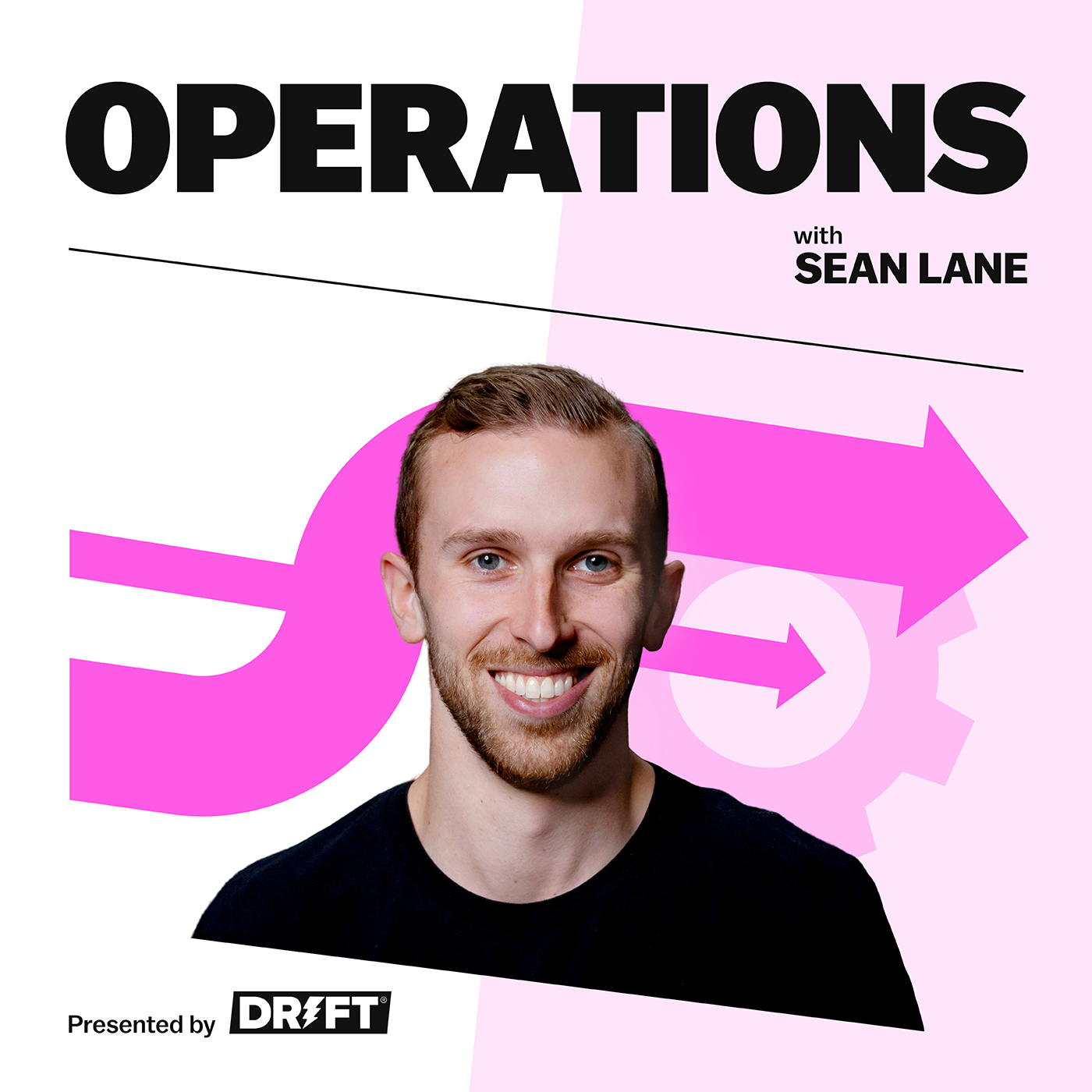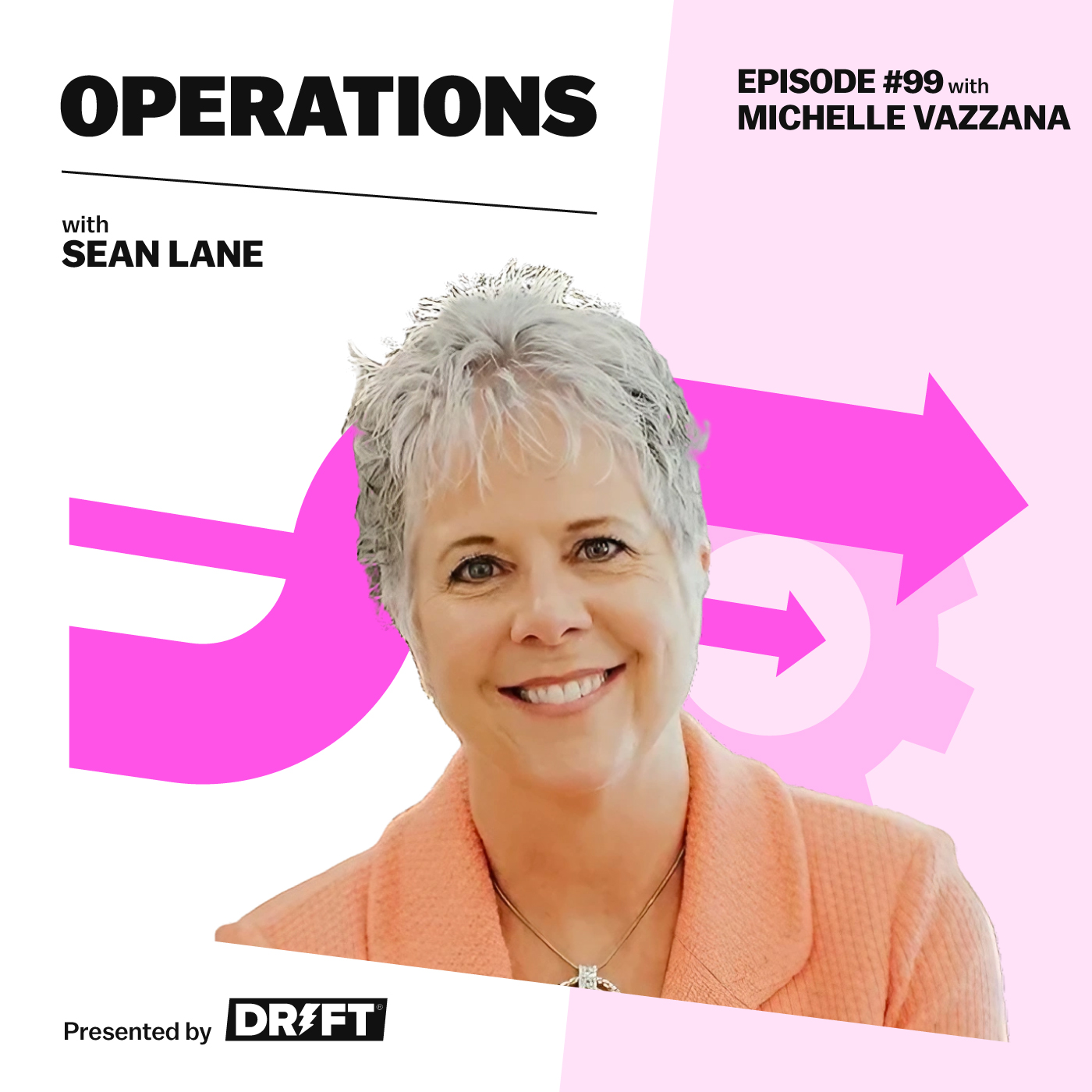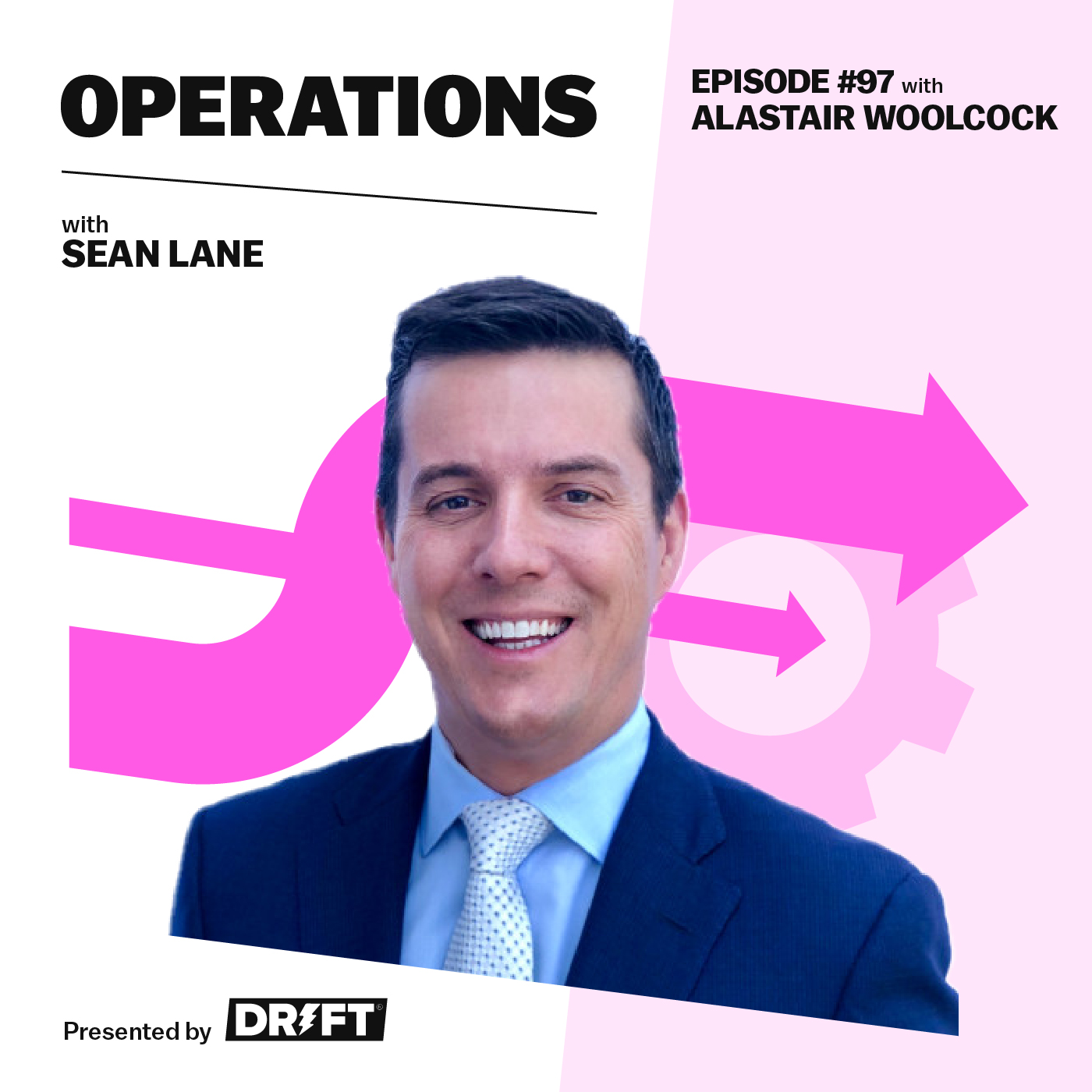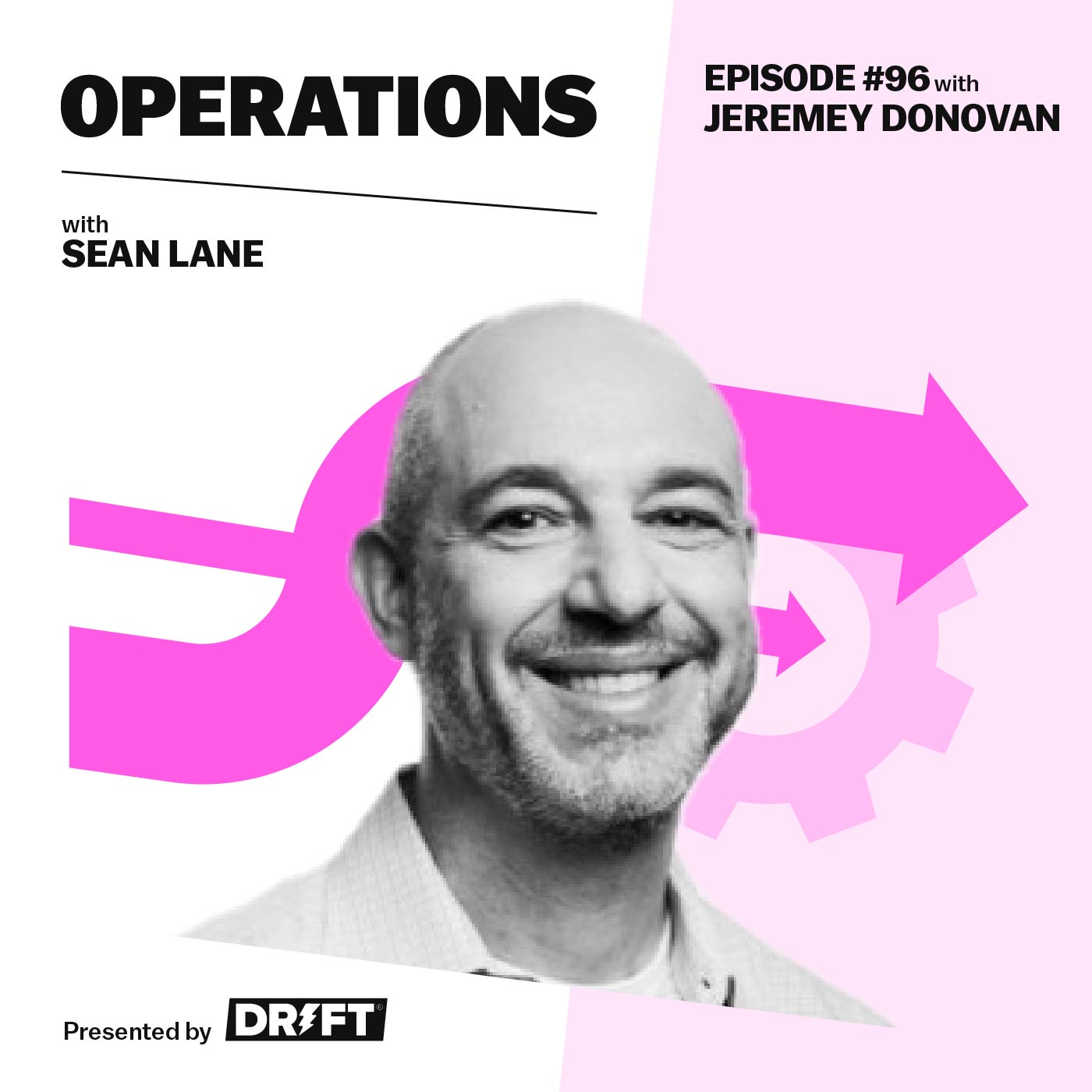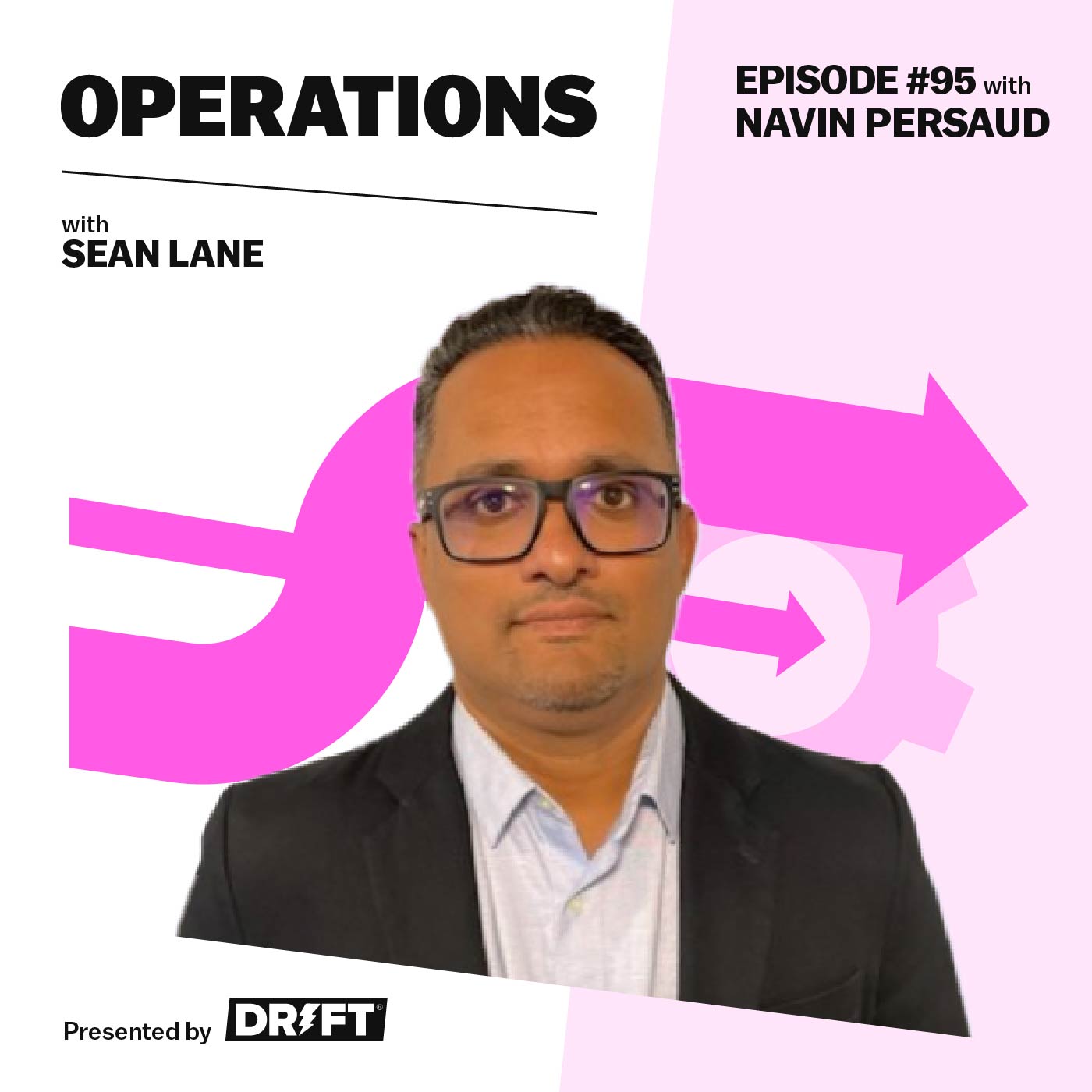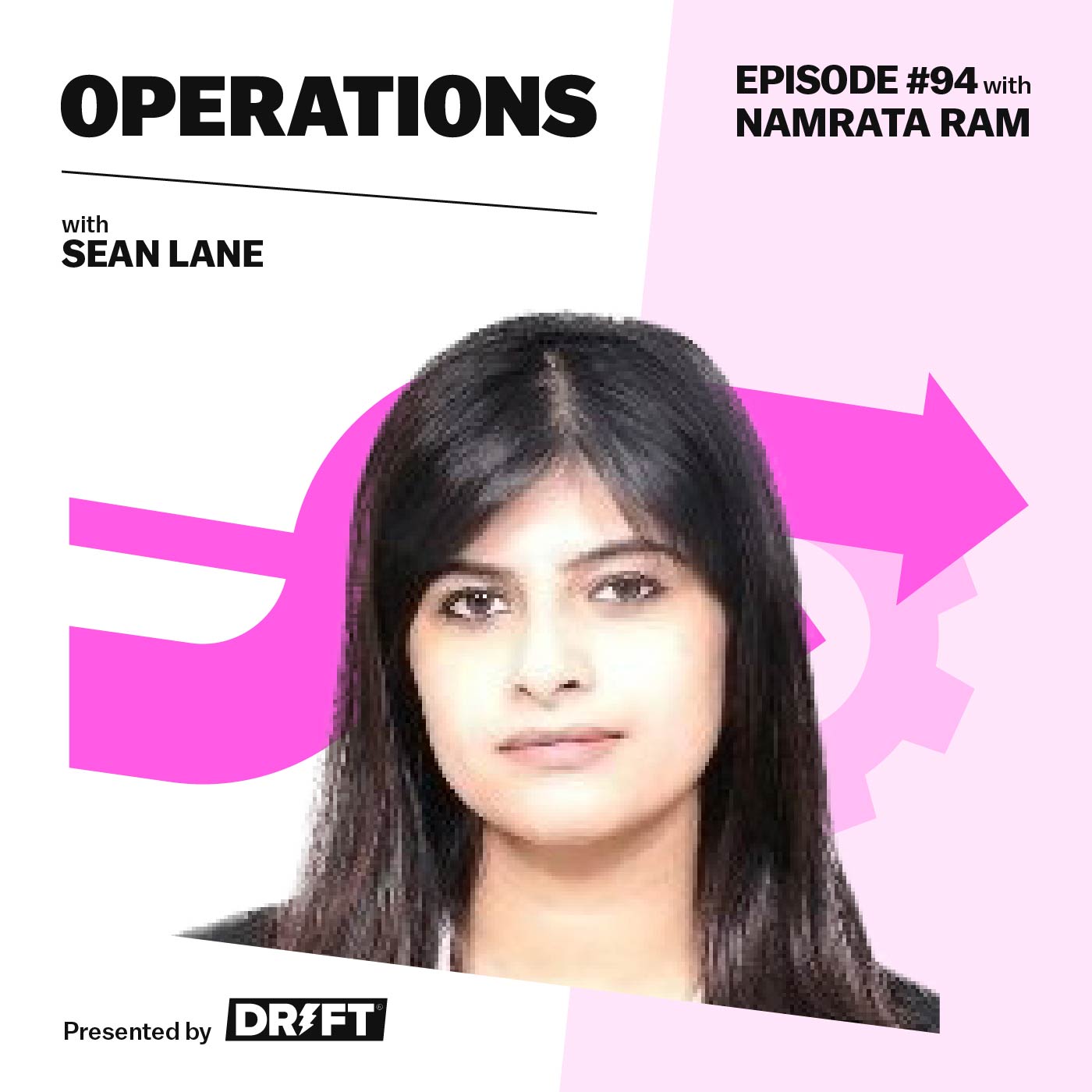Overcoming Imposter Syndrome as a New Operator with Ping Del Giudice
- 0.5
- 1
- 1.25
- 1.5
- 1.75
- 2
Sean Lane: Hey, everyone. Welcome to Operations, the show where we look under the hood of companies in hyper- growth. My name is Sean Lane. We've all, at some point, heard about or felt some flavor of imposter syndrome, that feeling where you're quite certain that you don't belong, and you're moments away from everyone figuring out that you're a complete fraud. When I was first starting out in my career, I assumed that those feelings of imposter syndrome were reserved for the up- and- comers, but looking back, with the benefit of more than a decade in SaaS and nearly 100 episodes of this show, I know that that assumption was foolish. I don't care if you're an intern or there's a C in front of your title, there's still some element of that self- doubt. And after talking with today's guest, I'm more convinced than ever that that hint of doubt, that nagging imposter syndrome, is a really good thing. Our guest today is Ping Del Giudice, vice president of revenue operations at Leapsome. Ping was recently named to the top 100 revenue operations leaders of 2022, and still even she has her own version of imposter syndrome. When I interviewed Ping, she was a little more than a year into her role as the VP of global rev ops at AppViewX, and I wanted to learn from her how she approaches joining a brand new company as an operator. In our conversation, we talk about losing all of your institutional knowledge when you leave your job. We talked about the inherent versus build decisions you have to make on a new team and the major project she found herself signing up for on just her second day on the job. Let's start though with her entry into a new business. What does that feel like coming in with a blank slate?
Ping Del Giudice: It's almost like when you finish elementary school. You would be fifth grade, the oldest in the middle school. Then, you go to middle school where it's like, " Oh, my gosh, I'm starting from all over." But, then you built that experience as well. That definitely should not discount that at all. I know it sounds cliché. We have two ears and one mouth for a reason. I'm definitely always listening and learning first. While you may have the experience under your belt where you've worked for myself, 15 years in the field, you don't know the company. It's the people there who know the company. It's listening and learning for sure, but then speak up when you see red flags, for example, or you think that, hey, you could provide value. But, a big part of me can't help but feel, do I really know what I'm talking about? I've done this for a long time, but what if it's not the case here in this company? You know what I mean?
Sean Lane: I think that's a healthy way to think about it, though. On your way in the door, now looking back, having a year under your belt, how much of it was, okay, this is what I can draw on from my breadth of experience, versus, oh, this is a very unique set of problems that are unique to this company?
Ping Del Giudice: That's a good question. I think because of the nature of my role, it's revenue operations. Luckily for me, the type of the company isn't as important when it comes to the product, assuming it's SaaS business, which luckily I have been in the SaaS business. The model and how you think about how processes and systems and all that fun stuff should be set up. You can apply it company to company, again assuming it's SaaS business. But, knowing myself, I don't want to come in and show people, hey, this is what I know. This is what you should do. Again, situations could be different. I did come in inheriting a relatively big team, the biggest team I've ever had, team of 10. I'm like, " Whoa, do I deserve to have 10 people in my belt? Can I really provide value?" Definitely, spending a lot of time with them, they've done this for a long time. One team member has been here 10 years. That experience, that institution knowledge, I don't know. You can't really learn that from a textbook, so to speak.
Sean Lane: I think it's pretty admirable and also very telling about you as a person that even with your experience and coming in as a vice president, you still have a little bit of that imposter syndrome as you're coming in. Obviously, you are very qualified for the job you have, otherwise you wouldn't have gotten it, right?
Ping Del Giudice: Thank you.
Sean Lane: But, is that how you actually felt when you were first starting? And, how do you deal with that in a way that is, both to your point, approached from a perspective of listening, but also, you now have to lead these 10 people?
Ping Del Giudice: I did feel that way a lot of the times. I won't lie. People listening to it now, hey, I did. I remember day two, it was a Tuesday. I start on Monday. I synced up with the VP of marketing where they were in the middle of launching the lead object into Salesforce. She walked me through a quick dirty rundown and said, " Hey, we're going to launch next week." I was very nervous and I said, " I know it's day two for me, but I don't think you're ready. I don't think we're ready." By that time, I was part of the team, so I don't think we're ready for it. She was, I think, somewhat relieved and went, " Okay, do you want to own this project?" To which I went, day two, you don't want to say no too quickly, I said, "Sure, okay." We did launch it. It was two months later, we launched. I definitely had huge help from my team, couldn't have done it myself.
Sean Lane: I'm sure you're getting the same sense as I am, but it's pretty clear the type of humble servant leader that Ping is. Even with extended experience and an impressive title, she's still out to prove herself, and she doesn't take anything for granted. She knows that there are some foundational SaaS elements that are transferrable based on her experience, but she still feels real imposter syndrome when she takes on a new role. But, ultimately she dives right in. She even caught herself and said, " We," when referring to her brand new team on day two. How can you not want to work with someone like that? I also think that the reaction she got from her marketing partner is more common and revealing than you might think. We all might be a little hesitant to speak up or offer an alternative when we're first starting in a new role, but that marketing leader, to their credit, didn't recoil at Ping's suggestion or ask, " What do you know?" She was relieved and immediately was like, " Please take this off my plate." And, that's true whenever you start a new job. You're going to inherit what's already there, teams, systems, baggage. So, I was curious how Ping evaluated what she was inheriting, versus what she needed to build on her own.
Ping Del Giudice: Definitely, getting feedback from the team. Ultimately, I'm not building this for myself. I'm not the ultimate users of these tools or the processes. I remember putting time on AEs and CSMs and the various leaders calendars, basically in advance asking them to prepare two questions to answer. What's working well? And, what can and should be better? Because, I really shouldn't just build something if there's no need. Kind of like sales 101, you don't show up and throw up. If it's working well, why change process? Unless, you think you know you can build it better and make it more efficient, then yeah, makes sense. But, I think the more focus would be if you talk to 10 people, eight, if not 10 of them are saying, " Hey, this thing is really annoying. We have to put it in three different places, or we have to click 10 things, if I can submit a quote," whatever it might be. Then, that should be somewhat of a red flag. Maybe you should focus on that first. So, that might be the replace, if it's something to replace. But, if it's working well, let's just keep it, at least for the time being. Because, as you come into a new job, sorry.
Sean Lane: No, go ahead.
Ping Del Giudice: Any new job, there's so much to learn. Usually, a role opens up, because there's also so much to do. Definitely, have to prioritize, prioritize.
Sean Lane: As you were taking that in, what did you learn? What did you learn about what was working well or what could, should be better?
Ping Del Giudice: Yeah, sometimes it goes back to the basic, I think. If you ask five different people, 10 different people, let's say what the numbers are for MQL for Q1, and you get five different answers, there might be a fundamental problem. Maybe there's no consistent definition, which is actually what I found when I first started. Somebody was calling MQL something else, versus SQL, versus SQO. So, the very basic, let's put a playbook, definitions. This is what we're calling MQL. This is what we're calling SQL and SQO. Then, not just do it and not share it, definitely share it with the team. Get feedback and then share it, ultimately.
Sean Lane: I feel like there's almost an art in and of itself to having those types of interview style conversations and how you react to that information, because on one end of the spectrum, you could hear those five, 10 different definitions and be like, " What are you guys doing? Every single one of you has a different answer for this count, but that's not a helpful or constructive way to react." So, what's on the other end of that spectrum? How did you work your way through those interviews in a way that, one, sets you up to fix them, but two, also set up these very early foundational relationships that you were going to need to be successful in this role?
Ping Del Giudice: Yeah, there's no ego. I think that's huge. Be humble in your approach. I'm here to help. I'm not here to take away anyone's job, unless they want me to in that project that was passed on very quickly. Yeah, definitely being humble about it, and have them somewhat see you as an ally. Let's work together. If there are silos, how do we remove the silos? If it makes sense to do a regular cadence, a weekly one- on- one, let's put that on the calendar. If I'm not clear about something, please, please always ask questions. If I'm not clear about something, I might apologize and say, " This might sound stupid, but hey, I have my questions."
Sean Lane: Have them see you as an ally. Ping took the time as she started her role to interview frontline teammates, really listen and observe what their day- to- day was like. The beauty of having a fresh set of eyes is you can really bring objectivity to your new role and your new company, which by the way, benefits the company. I think the other thing that's important to hear is to approach these situations, giving the benefit of the doubt to those who have come before you. Chances are those people are pretty smart, and at the time they made the decisions they made, they had a reason for why they made them. That doesn't mean the reason is still valid, but you might not have the context for what was true at the time. Those interviews ping conducted are critical to filling in what that historical context might have been. But, I also imagine the lists of problems she emerged with from those interviews were pretty long. So, what did she do next with her lists?
Ping Del Giudice: I won't lie, I was overwhelmed within my first month. I remember reaching out to my manager and said, " I don't know where to start. There's so much to do. You did tell me there's a lot to work on. This is a lot to work on." And, I was appreciative for what he said. " Take a step back. It's a big elephant, one bite at a time." I know it's a bad metaphor. I'm sorry.
Sean Lane: No.
Ping Del Giudice: Ultimately, because you are new, you have to prove yourself somewhat, right? So, the low hanging fruit, I feel like is really important. In my example, I did have three people in the team where they're fantastic. But, what I learned, what they were doing was basically data entry to a certain extent, doing things that we had tools, had purchased tools to do. So, I spoke with each of them and figured out what is your goal? What you do is important, but ultimately, I don't imagine this is what you want to do long term. If it is, that's okay. Tell me, too. That's totally fine. I feel like that's relatively low hanging fruit. From my perspective, it was relatively easy to do. Also, the bigger picture, the company's north star or what I see true rev ops' north star, it's always ARR, repeatable ARR. What can I do now that would have the greatest impact on ARR. If I have to rank it, it's the low hanging fruit, and then the greatest impact on ARR, and then to what I was saying early on, the feedback that you received from the team and what's working, what could be better. If you hear the same feedback from almost 100% of the team member where this is really annoying, this really sucks, maybe that should be higher on the priority list. Yeah, and because I did inherit a relatively big team, after learning as much as I could in the short time, what each of the team members' strengths were, keep empowering them. I'm here to help. I'm not here to hinder your job. You've been here for a long time. You've been doing great job. Keep going, right? The empowerment, I feel strongly about that, for sure. Keep them going.
Sean Lane: Within that, I'm hearing some people related things. I'm hearing some process related things. As you were assessing, it sounded like there was some level of impact versus effort, almost in terms of the way that you were going about the prioritization process. Is that something that you're doing yourself? Or, to your point of empowerment, how much of that are you thinking about, okay, how can I learn fast, but also empower the 10 people on my team to help me with all this low hanging fruit?
Ping Del Giudice: Yeah, I would say it's both. Whatever project that they have been working on, let's not stop it, assuming it's for good reasons. They almost all were. Keep going. Definitely keep going. From my perspective, putting down my list, which includes my team's list, and then I think something that may sometimes get overlooked is the communication path, right? Yes, I want to align with my team. Yes, I want to align with my manager, but rev ops is very much cross- functional. I need to align with the different departments, as well. If I have a plan to do something, and if it affects them, I need to make sure that they know about it and hopefully agree.
Sean Lane: Can you tell me a little bit more about what that communication looked like or what you learned in terms of making sure that all of those different cross- functional partners knew about your assessment and the early things that you thought were going to be the most important?
Ping Del Giudice: Yeah, I'm very much a note taker. I like to make lists almost everywhere. I have lots of lists. Here's the list I need to talk to my manager about. I remember putting together a presentation for rev ops, a first 90- day plan, and then plan for the first half of the year, second half the year, and so on, so forth. I started with the first 90- day plan, making sure that my manager and I were aligned, and then I shared it with the team so they can access it almost anytime they wanted to. I did break the 90- day down to first 30 days to tackle the low hanging fruit, because the first 30 days was a lot about the learning. But, then again being new, I wanted to show that, hey, I'm here. I can make an impact.
Sean Lane: I'm here, and I can make an impact. I feel like I should write that on a sticky note and stick it on the monitor of my desk. That's really what all operators want, to make an impact. So, if you're starting a new gig, I'd follow the order that Ping is preaching for prioritizing what you tackle first. One, find the low- hanging fruit. Two, find what will have the biggest impacts to ARR. Three, follow the areas where you hear the most consistent feedback about what sucks. Lastly, communicate early and often with your cross- functional partners about what you're finding and what you're prioritizing. Ping, of course, used this communication as an opportunity to fill in her own blind spots. I can't help but think that her version of imposter syndrome, her humility are key ingredients to what make her such a successful operator. Before we go, at the end of each show, we're going to ask each guest the same lightning round of questions. Ready? Here we go. Best book you've read in the last six months?
Ping Del Giudice: I wish you had given me time to prepare, Sean.
Sean Lane: That's okay. That's why we do it on the spot.
Ping Del Giudice: Oh, man. I want to say that I have a 12- year- old daughter. Being in the tween, I wasn't exactly a great tween myself, so sometimes it's payback time. It's also very different time, very different time. I recently read this book called Reviving Ophelia. Yeah, I don't know how applicable this might be to a lot of people.
Sean Lane: It doesn't have to be a business book.
Ping Del Giudice: It definitely opened up my eyes where I didn't grow up with all that much technology. Right now, she has a phone. The internet is right at her fingertip, some helpful tips there.
Sean Lane: Cool. All right, favorite part about working in ops?
Ping Del Giudice: I get to remain neutral. It's so important to be neutral. It's not sales versus CS or product versus technical sales, I would say. We all work together. I get to be neutral. I like that.
Sean Lane: All right, so flip side, least favorite part about working in ops?
Ping Del Giudice: A lot of people see ops as backend, which is not exactly wrong, but I don't see that as the main part of ops. I see the main part of my role at least, it's a strategy part. I get to use my brain. I like doing that. When people assume you are backend, you're support, you're admin, I don't quite like that.
Sean Lane: Yeah. Someone who impacted you getting to the job you have today?
Ping Del Giudice: I would definitely say the CRO. Yeah, he did bring me on board. He is somebody who lets me run, trusts that I will go to him with issues if there are issues. He was one who says, " It's a big elephant. Take one chunk at a time," so definitely.
Sean Lane: Awesome. All right, last one, one piece of advice for people who want to have your job someday?
Ping Del Giudice: Oh, ask questions. You have a lot of customers. Your customers are the sales reps, the sales managers, the CSMs, the CS managers, marketing, product, the leadership team. Make sure you ask questions. Don't assume things.
Sean Lane: Thanks so much to Ping for joining us on this week's episode of Operations. If you liked what you heard, make sure you're subscribed to our show so you can get a new episode in your feed every other Friday. Also, if you learned something from Ping today or from any of our episodes, please leave us a review on Apple Podcasts or Spotify or wherever you get your podcasts, six star reviews only. All right, that's going to do it for me. Thanks so much for listening. We'll see you next time.
DESCRIPTION
We’ve all at some point heard about or felt some flavor of imposter syndrome - that feeling where you are quite certain you don’t belong and you’re moments away from everyone figuring out you’re a fraud.
After talking with today’s guest, I’m more convinced than ever that that hint of doubt, that nagging imposter syndrome, is actually a really good thing.
Our guest today is Ping Del Giudice, Vice President of Revenue Operations at Leapsome. Ping was recently named to The Top 100 Revenue Operations Leaders of 2022, and still, even she experiences her own version of imposter syndrome.
In our conversation, Ping and I talk about losing all of your institutional knowledge when you leave your job, the inherit vs. build decisions you have to make when joining a new team, and the major project she found herself signing up for on just her second day on the job.
Key Points:
- (01:51) What it feels like to enter a new profession with a blank slate
- (07:14) How Ping balanced what projects she was inheriting vs. understanding what she needed to build on her own when starting her new role
- (12:01) How Ping prioritized which big projects to tackle first
- (17:47) Operations lightning round
Like this episode? Be sure to leave a ⭐️⭐️⭐️⭐️⭐️⭐️ review and share the pod with your friends! You can connect with Sean on Twitter @Seany_Biz and @DriftPodcasts, and Ping on LinkedIn.
Today's Host
Sean Lane
Today's Guests
